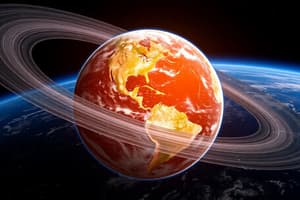Podcast
Questions and Answers
Name the four seasons in the order in which they occur:
Name the four seasons in the order in which they occur:
Winter, Spring, Summer, Fall
What is the main cause of the Earth's seasons?
What is the main cause of the Earth's seasons?
Tilt of the earth and revolution of the earth around the sun
What is the main cause of day and night?
What is the main cause of day and night?
The Earth's rotation on its axis
Why does the sun appear to move across the sky?
Why does the sun appear to move across the sky?
Explain the difference between rotate and revolve:
Explain the difference between rotate and revolve:
What is the tilt of the Earth's axis (in degrees)?
What is the tilt of the Earth's axis (in degrees)?
During which season do the sun's rays hit the Earth at the most direct angle?
During which season do the sun's rays hit the Earth at the most direct angle?
During which season are the hours of daylight the shortest?
During which season are the hours of daylight the shortest?
What is the name of the day with the least amount of daylight hours?
What is the name of the day with the least amount of daylight hours?
What is the name of the day with the longest amount of daylight hours?
What is the name of the day with the longest amount of daylight hours?
What is the name of a day in which the hours of daylight and darkness are equal?
What is the name of a day in which the hours of daylight and darkness are equal?
What is the name of the rise and fall of the water level?
What is the name of the rise and fall of the water level?
What is the reason for the rise and fall of water levels?
What is the reason for the rise and fall of water levels?
The name of the highest high tide is called what?
The name of the highest high tide is called what?
What causes spring tides to be so high?
What causes spring tides to be so high?
List the order of the Earth, moon and sun in order from largest to smallest.
List the order of the Earth, moon and sun in order from largest to smallest.
Explain why a full moon appears larger than the sun.
Explain why a full moon appears larger than the sun.
List the planets in order from the sun:
List the planets in order from the sun:
Describe the main reason for the different temperatures on the planets in the solar system.
Describe the main reason for the different temperatures on the planets in the solar system.
Flashcards
Four Seasons
Four Seasons
Winter, Spring, Summer, and Fall
Cause of Seasons
Cause of Seasons
The tilt of Earth's axis as it revolves around the Sun
Cause of Day and Night
Cause of Day and Night
Spinning of Earth on its axis
Sun's Apparent Movement
Sun's Apparent Movement
Signup and view all the flashcards
Earth's Axial Tilt
Earth's Axial Tilt
Signup and view all the flashcards
Summer Sunlight
Summer Sunlight
Signup and view all the flashcards
Winter Solstice
Winter Solstice
Signup and view all the flashcards
Summer Solstice
Summer Solstice
Signup and view all the flashcards
Equinoxes
Equinoxes
Signup and view all the flashcards
Moon Phases
Moon Phases
Signup and view all the flashcards
Lunar Eclipse
Lunar Eclipse
Signup and view all the flashcards
Solar Eclipse
Solar Eclipse
Signup and view all the flashcards
Why Eclipses Don't Happen Every Month
Why Eclipses Don't Happen Every Month
Signup and view all the flashcards
Tides
Tides
Signup and view all the flashcards
Causes of Tides
Causes of Tides
Signup and view all the flashcards
Spring Tides
Spring Tides
Signup and view all the flashcards
Size Order
Size Order
Signup and view all the flashcards
Planetary Temperatures
Planetary Temperatures
Signup and view all the flashcards
Planets in Order
Planets in Order
Signup and view all the flashcards
Study Notes
Seasons and Earth's Rotation
- Four seasons in order: Winter, Spring, Summer, Fall.
- Earth's tilt and revolution around the Sun cause seasons.
- The rotation of Earth on its axis is responsible for day and night.
Sun's Movement and Earth’s Axes
- Sun appears to move across the sky due to Earth's rotation.
- Earth's axis is tilted at an angle of 23.5 degrees.
Seasonal Sunlight
- Summer: Sun’s rays hit Earth at the most direct angle.
- Winter: Hours of daylight are shortest; Earth is tilted away from the Sun.
- Winter Solstice occurs on December 21st or 22nd, marking the least daylight.
- Summer Solstice on June 21st marks the longest daylight hours.
Equinoxes
- Equinoxes occur when daylight and darkness hours are equal on March 21st and September 21st.
Moon Phases
- Moon phases result from its position between Earth and Sun, affecting visibility of sunlight reflection.
Eclipses
- Lunar eclipses occur approximately every six months.
- Solar eclipses also happen roughly twice a year.
- Eclipses do not occur every month due to misalignment of the Sun, Earth, and Moon.
Tides
- Tides are the rise and fall of water levels on Earth.
- Gravitational pull from the Sun and Moon causes tides.
- Spring Tides are the highest, occurring twice a month during full and new moons.
Solar System and Planets
- Order of celestial bodies from largest to smallest: Sun, Earth, Moon (S.E.M).
- Full Moon appears larger than the Sun due to its proximity to Earth.
- List of planets from the Sun with key notes:
- Mercury: Closest to the Sun.
- Venus: Known for its extreme greenhouse effect.
- Earth: Only known planet to support life.
- Mars: Known as the red planet.
- Jupiter: Largest planet in the solar system.
- Saturn: Renowned for its impressive ring system.
- Uranus: Has a unique sideways rotation.
- Neptune: Farthest planet known for strong winds; Pluto is classified as a dwarf planet.
Influence of Distance on Planetary Temperatures
- Planet temperatures vary mainly due to distance from the Sun and internal core temperature.
Studying That Suits You
Use AI to generate personalized quizzes and flashcards to suit your learning preferences.




